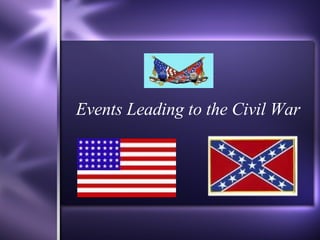Road To Civil War
- 1. Events Leading to the Civil War
- 2. Article 1, Section 2, Clause 3 of the United States Constitution Representatives and direct Taxes shall be apportioned among the several States which may be included within this Union, according to their respective Numbers, which shall be determined by adding to the whole Number of free Persons, including those bound to Service for a Term of Years, and excluding Indians not taxed, three fifths of all other Persons.
- 3. Article 1, Section 9, Clause 1 of the United States Constitution The Migration or Importation of such Persons as any of the States now existing shall think proper to admit, shall not be prohibited by the Congress prior to the Year one thousand eight hundred and eight, but a tax or duty may be imposed on such Importation, not exceeding ten dollars for each Person.
- 4. Article 4, Section 2, Clause 3 of the United States Constitution No Person held to Service or Labor in one State, under the Laws thereof, escaping into another, shall, in Consequence of any Law or Regulation therein, be discharged from such Service or Labor , But shall be delivered up on Claim of the Party to whom such Service or Labor may be due.
- 5. Eli Whitney’s invention of the cotton “gin” (short for engine) revolutionized the cotton industry in the United States. Prior to, farming cotton required 100s of man-hours to separate cottonseed from raw cotton fibers. His machine could generate up to fifty pounds of cleaned cotton daily made cotton production profitable for the southern states and made slavery profitable too.
- 6. Effects on the society in the South from “Cotton is King” "Without the firing of a gun, without drawing a sword, should they [Northerners] make war upon us [Southerners], we could bring the whole world to our feet. What would happen if no cotton was furnished for three years? England would topple headlong and carry the whole civilized world with her. No, you dare not make war on cotton! No power on earth dares make war upon it. Cotton is King.” Senator Hammond (SC) -1858
- 7. Effects on the society in the South from “Cotton is King” The Southern aristocracy, which slavery created, dominated Southern society and inhibited the development of efficient methods for soil use. In the face of soil exhaustion, Southern planters needed to extend control into the fresh lands of western territories. Hence, territorial expansion became a sectional issue as both North and South realized that western lands were essential for the survival of the Southern slave culture.
- 8. The Missouri Compromise 1820: 11 free states,11 slave states gave each faction equal representation in the Senate gave each power to prevent passage of legislation not to its liking The free states, with their much larger populations, controlled the House of Representatives, 105 votes to 81.
- 9. The Missouri Compromise March 3, 1820, Maine petitioned Congress for statehood. Both states were admitted, a free Maine and a slave Missouri the balance of power in Congress was maintained as before. 36’ 30” line divided free and slave territory in Louisiana Purchase Territory
- 10. North & South’s split over the tariff North’s view - The factories were for the most part in the North Northerners clamoured for duties on imported goods. North wanted to keep out foreign goods, or at least make them so dear that it would pay people to buy American made goods.
- 11. North & South’s split over the tariff South’s view - The South did not manufacture things and wanted the duties to be kept low. 1828 law made the duties so high that many people were very angry, called it the "tariff of abominations.” In the South, many people were so angry that they swore never to buy anything from the North until the tariff was made lower.
- 12. States’ Rights, John C.Calhoun’s Ordinance of Nullification Calhoun pushed theory of nullification states' rights theory where states declare null & void federal laws they deemed to be unconstitutional. South Carolina voted to nullify the tariff law in their state.
- 13. Nat Turner’s slave revolt August 22, 1831, a band of slaves, led by a lay preacher named Nat Turner, killed five. Over a 36 hour period, band of slaves grew to 60 or 70 and killed 58 White persons Virginia Militia and local residents killed or captured the insurgents raised southern fears of a general slave uprising and had a profound influence on the attitude of Southerners towards slavery
- 14. Wilmot Proviso After Mexican War, question arose: what to do with territory won from Mexico? Rep David Wilmot proposed in a bill: never allow slavery in any of this territory Passed in House several times, 1846 - 47 Never made it through Senate since it was evenly divided.
- 15. Compromise of 1850 In 1850: 15 free states, 15 slave states California sought admission to Union Compromise offered to please both sides CA entered Union as a free state New Fugitive Slave Act passed Slave Trade outlawed in Washington DC Slavery still allowed in Washington DC NM Territory and Utah Territory would decide by “popular sovereignty” (people there would decide for themselves).





![Effects on the society in the South from “Cotton is King” "Without the firing of a gun, without drawing a sword, should they [Northerners] make war upon us [Southerners], we could bring the whole world to our feet. What would happen if no cotton was furnished for three years? England would topple headlong and carry the whole civilized world with her. No, you dare not make war on cotton! No power on earth dares make war upon it. Cotton is King.” Senator Hammond (SC) -1858](https://image.slidesharecdn.com/road-to-civil-war-1203376251972174-4/85/Road-To-Civil-War-6-320.jpg)








